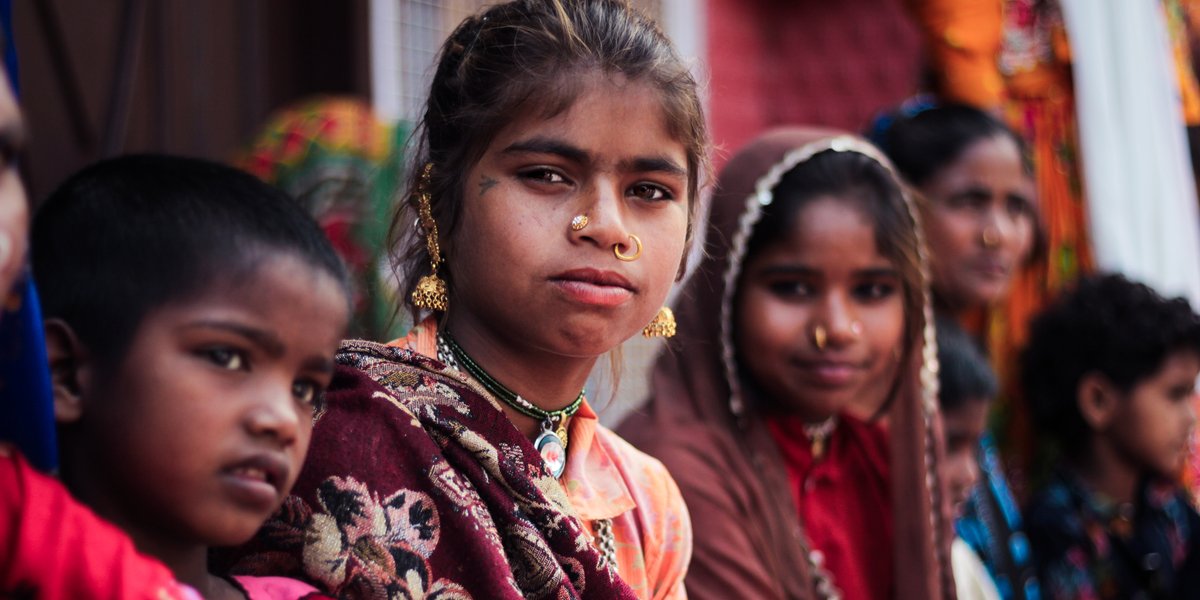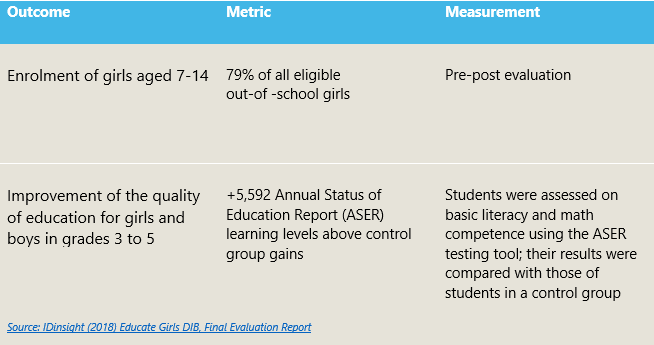
- Impact bond
- Education
- Asia
Rajasthan, India
5 mins
Educate Girls
Last updated: 14 Oct 2022
The Educate Girls Development Impact bond was the first DIB to launch worldwide that seeks to enrol and improve the quality of education for 15,000 girls in Rajasthan, India.
Project Location
Aligned SDGs

INDIGO Key facts and figures
-
INDIGO project
-
Commissioner
-
Intermediary
-
Investor
-
Provider
-
Launch date
May 2015
-
Start of service provision
June 2015
-
Duration
2 years
-
Capital raised (minimum)
CHF 267.73k
(USD 292.90k)
-
Service users
18k+
Target population
Out-of-school girls in Rajasthan. Educate Girls compiled and maintained a census of out-of-school girls in treatment villages, which IDinsight validated each year.
The problem
In spite of the Indian government’s substantial commitment to education, nearly three million girls are still out of school despite being eligible. The country has the largest illiterate population in the world. Rajasthan has particularly poor school access for girls. In rural parts of the state, a girl is more than twice as likely to be out of school compared to a boys and only 50% of women can read or write.
The solution
The Educate Girls Development Impact Bond (DIB) was the first DIB to launch worldwide. The DIB was initiated with the intention to scale Educate Girls’ impact, with a target to enrol and improve the quality of education for 15,000 girls in Rajasthan. Educate Girls has a proven model and performance history which made it attractive to investors and a suitable programme to initiate a DIB contract.
Educate Girls utilises an integrated community-based approach to provide education to young girls aged 6-14 in Rajasthan India. Educate Girls' strong community ties provides them with a unique position to positively influence and communicate the value of education within rural Indian communities in Rajasthan. Educate Girls' understanding of the cultural context and its flexible teaching approach, allows them to create tailored teaching programmes that adapt to the needs of the end user, which ultimately improves the quality of their education.
The impact
In July 2018, the results of the DIB were announced, it achieved above its target – 116% of the enrolment target and 160% of the learning target in its final year. UBS Optimus Foundation (the investor) recouped their initial funding of 270,000 dollars plus a return of 15 percent. The DIB agreement introduced a shift from classroom-focused to group-focused approach, where each group was based on the competency levels of children, each child’s progress was tracked, and teaching sessions were increased overall.
Additionally, Educate Girls provided after-school support, community volunteers proactively met students and parents outside of the classroom to address specific concerns and focused on outreach to improve enrolment of students in hard-to-reach districts. The outcomes of the DIB provide encouraging results for organisations thinking about enlisting a DIB to finance an outcomes-based project to scale impact within a developing country.
Outcomes framework
The table below outlines the outcomes metrics that are used to trigger outcomes payments.

Educate Girls developed their outcomes metrics with direction from the Children’s Investment Fund Foundation (CIFF) which was measured and audited by ID-Insight. The focus of the DIB captured two main development areas:
- Enrolment of girls aged 7-14 in basic education
- Improvement of the quality of education of boys and girls in grades 3-5
Payments between outcomes of enrolment and education were determined through an 80:20 split, 80 percent of payments were tied up with improved learning outcomes and the remaining 20 was determined by Educate Girl’s ability to identify out-of-school girls and re-enrol girls that had previously dropped out of school.
Enrolment outcomes: Student enrolment is defined by the percentage of out-of-school girls (between age 7 and 14) enrolled in school by the end of the third year. Educate Girls performed a door-to-door primary survey identifying out-of-school girls, ensuring an accurate target group at the start of the intervention. ID Insight independently verified the accuracy of the enrolment list by sampling a portion of the lists and conducting school and household visits.
Learning outcomes: Students’ learning was measured using the ASER test, a widely used test of basic literacy and numeracy. The test measured three proficiencies: Hindi, English and Mathematics. The tests were administered to students before and after the intervention. ID Insight measured the impact based on learning gains (from one test to another between students enrolled in the program and in nearby control villages) for students in grades three to five over the course of the program.
Timeline
-
Sept 2014 - Jan 2015
Stakeholder engagement - Getting investors and outcomes funders on-board
-
Feb - July 2015
Evaluation Design – Treatment Assignment, finalising evaluation design and preparing data collection instruments
-
Aug - Sept 2015
Validation of enrolment lists and carrying out the baseline survey
-
March 2016
Year 1 interim report - 44% of enrolment and 23% of learning targets achieved
-
March 2017
Year 2 interim report - Results showed 87.7% of enrolment and 50.3% of learning targets achieved
-
Jan 2018
Completion of endline survey
-
July 2018
Final presentation of results
"The continuous feedback and analysis of data allowed us to identify learning lags in children and weaknesses in our own teams. This led us to redesign our curriculum from scratch and retrain our staff."
-Safeena Husain, Founder and Executive Director of Educate Girls
Project insights
Scaling impact
The DIB enabled Educate Girls to rigorously test their model with full transparency, much better performance management and evaluation against a control group so that causal impact was clear. The DIB allowed Educate Girls to establish the most effective and high impact programme possible; they wanted to ensure that they were scaling quality and not just scaling for scale’s sake and that they we were accountable to every child. In doing so, results and information from the DIB provided them with a better foundation to scale their impact in the future.
Source: Vabyanti Endrojono-Ellis, Innovative Financing in Development: The Use of Impact Bonds in Developing Countries, Working Paper.
Alleviating risk
The DIB provided an opportunity for Educate Girls to transfer the risk of scaling and to test new methodologies to deliver their impact. This gave Educate Girls a chance to trial new ideas without compromising their risk profiles. According to Maharshi Vaishnav, Director of Communication at Educate Girls, the only risk a delivery partner holds is reputational risk as the financial risk is held with the investor. Outcomes funders CIFF also talked about the risk-free element to DIBs, however, there is a compliant and reputational risk that they believe was properly managed and mitigated through the design of the DIB.
Source: Vabyanti Endrojono-Ellis, Innovative Financing in Development: The Use of Impact Bonds in Developing Countries, Working Paper.
Flexibility in delivery
Safeena Husain, Executive Director of Educate Girls, comments on the benefits of flexibility: “The DIB has brought about a shift in our organisation’s DNA and had a positive ripple effect across our entire organisation. The razor-sharp focus on outcomes and the flexibility in programme delivery that comes with a payment-by-results contract has enabled us to deliver improved outcomes”. Whatever the approach, there seems to be agreement that innovation requires a qualitatively different type of funding from other activities. It requires funding methods that are more accepting of risk, and which come combined with complementary resources like support, advice and training. These methods help funders to be far more adept at spotting opportunities than is possible within the constraints of a standard grant application form.
DIBs have so far shown to be flexible financing mechanisms to allow the delivery partners to try and test new methods of delivery giving the delivery partner both agency and control over their theory of change. There is often a concern that donor agencies override agendas of staff and communities on the ground.
Source: World’s First Development Impact Bond for Education: What Educate Girls Has Learned.
Research & Design
As part of the DIB contract, Educate Girls needed to produce more data than they did prior to the DIB. Although Educate Girls were already moving in this direction prior to the DIB, a project management system (PMS) was established during the initiation of the DIB. The PMS system enabled Educate Girls to gather more reliable data and an opportunity to ‘slice and dice’ the data in more complex ways. Educate Girls were able to collect information through better data collection at no financial risk of its own giving them the opportunity to learn more about its service areas, essentially investing in research and design.
Source: Vabyanti Endrojono-Ellis, Innovative Financing in Development: The Use of Impact Bonds in Developing Countries, Working Paper.
Interview with Alison Bukhari, Educate Girls
References
Communication with Alison Bukhari, UK Director, Educate Girls, 2018.
Vabyanti Endrojono-Ellis, Innovative Financing in Development: The Use of Impact Bonds in Developing Countries, Working Paper, 2018.
Educate Girls Development Impact Bond, Final Evaluation Report, 2018.
Downloads and Resources
Educate Girls Results Brochure 2018
Download PDF